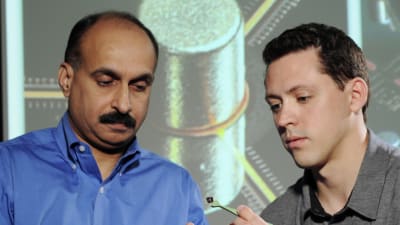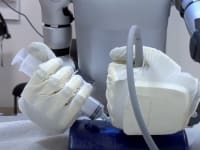61
12,105,170,194,926
-1
3600
30
News
Simulation Optimizes Electric, Gas, and Water Grids
Researchers at the Fraunhofer Institute in Germany have developed new software that can be used to analyze and optimize transport grids for electricity, gas, and water, even at the planning stage, based on numerical simulations. This can lighten the tasks of retrofitting and expansion, save energy...
News
New Software Provides Fast Simulation of Catastrophic Flooding
All over the country, millions of Americans still live behind dams or levees, and if these were to fail and unleash catastrophic flooding, as some did in New Orleans in 2005, property and life might once again pay the price. Answers to at least some of the problem are now on the way,...
News
Software Simulator Helps Improve Software
The earlier a problem is detected, the easier it can be solved. Before implementing complex programs in a time-consuming process, computer scientists also want to know whether they will reach the desired performance. The PALLADIO simulation tool, developed by Professor Ralf Reussner at the Karlsruhe...
News
Gas Sensor Enables Better Separation of Chemicals
A gas sensor could one day be used to detect chemical weapon vapors or indicators of disease more precisely than current models do. The device also consumes less power, which is crucial for stretching battery life in a mineshaft or an isolated clinic.A pump and compressor collect gas from the first...
News
Gold Nanoparticles Self-Assemble into Device-Ready Thin Films
Scientists with the Lawrence Berkeley National Laboratory (Berkeley Lab) and the University of California (UC) Berkeley have directed the first self-assembly of nanoparticles into device-ready materials. Through a technique based on blending nanoparticles with block co-polymer...
News: Energy
Stanford University engineers have found a novel method for "decorating" nanowires with chains of tiny particles to increase their electrical and catalytic performance. The technique is...
Blog
The Race Is On!
Most people know me as the editor of high-tech engineering magazines such as Defense Tech Briefs, Embedded Technology, Photonics Tech Briefs, and Lighting Technology. What they don’t know is that for the past 39 years I’ve maintained an exciting part-time career as an auto racing writer and photographer. In that time I’ve...
News
System Uses Terahertz Waves to Scan Aircraft Nose
Radio signals reach pilots on board an aircraft through the “radar dome,“ the rounded nose of the aircraft. But the errors that occur during the production of this nose — tiny foreign particles, drops of water or air bubbles — can impede radio traffic. In the future, a non-destructive...
News
Researchers Create Glare-Free Glass
A new way of creating surface textures on glass, developed by researchers at MIT, virtually eliminates reflections, producing glass that is almost unrecognizable because of its absence of glare — and whose surface causes water droplets to bounce right offThrough a process involving thin layers of material...
News
Ultra-Compact Motor Could Drastically Reduce Space Exploration Costs
The first prototype of a new, ultra-compact motor that will allow small satellites to journey beyond Earth’s orbit has been developed by École Polytechnique Fédérale de Lausanne (EPFL) in Switzerland. The goal of the micro motor is to drastically reduce the cost of space...
News
Robotic Operations Advance Satellite Servicing in Space
NASA's Robotic Refueling Mission (RRM) experiment aboard the International Space Station (ISS) has demonstrated remotely controlled robots and specialized tools can perform precise satellite-servicing tasks in space. The project marks a milestone in the use of the space station as a technology...
News: Automotive
Wireless Bicycle Brake Could One Day Stop a Train
Wireless networks today are able to brake just one bike, but in the future, they could regulate entire trains. Computer scientists at Saarland University in Germany are designing mathematical calculations to check such systems automatically. Professor Holger Hermanns, whose group developed the...
News: Green Design & Manufacturing
Harnessing solar energy can be as simple as tuning the optical and electronic properties of metal oxides at the atomic level by making an artificial crystal or super-lattice...
News: Green Design & Manufacturing
Achieving Better Lithium-Sulfur Batteries With Carbon Nanoparticles
As the number of mobile electronic devices from smart phones to e-bikes increases steadily worldwide, so does the demand for small, lightweight, and powerful batteries. Experts are looking at lithium-sulfur batteries as the next step in energy storage.
News: Energy
Boosting Energy Efficiency of Multi-Hop Wireless Networks
Multi-hop wireless networks can provide data access for large and unconventional spaces, but they face significant limits on the amount of data they can transmit. North Carolina State University researchers have developed a more efficient data transmission approach that can boost the amount...
News
Microscope Lens Produces Hours of Scientific Work in Seconds
A new form of microscope that can produce results in seconds rather than hours -- dramatically speeding up the process of drug development -- is being developed at the University of Strathclyde in the UK. Scientists are creating the Mesolens -- a lens that will be capable of showing...
News: Imaging
Imaging System Can Peer Around Corners
Last December, MIT Media Lab researchers caused a stir by releasing a slow-motion video of a burst of light traveling the length of a plastic bottle. But the experimental setup that enabled that video was designed for a much different application: a camera that can see around corners.
News
New Endoscope Imaging Could Enable “Molecular-Guided” Cancer Surgery
With more than 15 million endoscope procedures done on patients each year in the US alone, scientists report evidence that a new version of these flexible instruments for diagnosing and treating disease shows promise for helping surgeons more completely remove cancerous...
Question of the Week
By 2020, will the majority of consumers use mobile phones instead of cash?
Consumers can currently pay for products with mobile apps, and many tools are available to turn smartphones into mobile cash registers. Sixty-five percent of respondents to a Pew Internet & American Life Project survey say that by 2020 most people will have fully adopted the...
News
NASA Flight-Tests Surveillance Device on Unmanned Aircraft
NASA's Dryden Flight Research Center flew its Ikhana MQ-9 unmanned aircraft with an Automatic Dependent Surveillance-Broadcast (ADS-B) device for the first time last month. It was the first time an unmanned aircraft as large as Ikhana – with a 66-foot wingspan, a takeoff weight of more...
News
Navy’s Smart Robocopters Spy on Pirate Vessels in a Crowd
Navy unmanned aircraft will be able to distinguish small pirate boats from other vessels when an Office of Naval Research (ONR)-funded sensor starts airborne tests this summer. Called the Multi-Mode Sensor Seeker (MMSS), the sensor is a mix of high-definition cameras, mid-wave infrared...
News
Software Enables Automatic Aircraft Navigation and Collision Avoidance
Researchers from the Universidad Politécnica de Madrid in Spain have developed an automatic air navigation and collision avoidance model using an automatic learning system. Based on how human beings learn to perceive motion, the model builds software using a simulator-based...
News
Nanocrystal-Coated Fibers Harvest Energy
Researchers are developing a technique that uses nanotechnology to harvest energy from hot pipes or engine components to potentially recover energy wasted in factories, power plants, and cars.Researchers have coated glass fibers with a new thermoelectric material they developed. When thermoelectric materials...
News: Medical
Brain-Machine Interface Delivers Signals to Move Paralyzed Hand
A new Northwestern Medicine brain-machine technology delivers messages from the brain directly to the muscles -- bypassing the spinal cord -- to enable voluntary and complex movement of a paralyzed hand. The device could eventually be tested on, and perhaps aid, paralyzed patients.The...
News: Energy
The U.S Department of Energy has recently announced up to $4 million available this year to accelerate the development and deployment of wireless charging systems for light-duty electric vehicles...
News
X-Ray Method Visualizes How Powder Becomes Molten Glass
Scientists have for the first time visualized the transformation of powder mixtures into molten glass. A better understanding of this process will make it possible to produce high quality glass at lower temperatures, leading to significant energy savings in industrial glass manufacturing. The...
News
Magnetic Testing Prevents Failure of Microelectronic Devices
Taking advantage of the force generated by magnetic repulsion, researchers have developed a new technique for measuring the adhesion strength between thin films of materials used in microelectronic devices, photovoltaic cells, and microelectromechanical systems (MEMS).The fixtureless and...
Question of the Week
Will augmented-reality technology catch on?
On Wednesday, Google previewed an initiative called Project Glass. The company created wrap-around glasses with a clear display that sits above the eye. The wearable-computing technology streams information to the lenses and allows the wearer to send and receive messages through voice commands. A built-in...
News: Energy
Making use of the force generated by magnetic repulsion, Georgia Tech researchers have developed a new technique for measuring the adhesion strength between thin films of...
Top Stories
Blog: Manufacturing & Prototyping
2025 Holiday Gift Guide for Engineers: Tech, Tools, and Gadgets
INSIDER: Research Lab
Scientists Create Superconducting Semiconductor Material
Blog: Software
Quiz: Materials
Blog: Aerospace
Tech Briefs Wrapped 2025: Top 10 Technology Stories
Blog: Manufacturing & Prototyping
Webcasts
 Upcoming Webinars: AR/AI
Upcoming Webinars: AR/AI
The Real Impact of AR and AI in the Industrial Equipment Industry
 Upcoming Webinars: Motion Control
Upcoming Webinars: Motion Control
Next-Generation Linear and Rotary Stages: When Ultra Precision...
 Upcoming Webinars: Energy
Upcoming Webinars: Energy
Hydrogen Engines Are Heating Up for Heavy Duty
 Podcasts: Medical
Podcasts: Medical
How Wearables Are Enhancing Smart Drug Delivery
 Podcasts: Power
Podcasts: Power
SAE Automotive Podcast: Solid-State Batteries





























